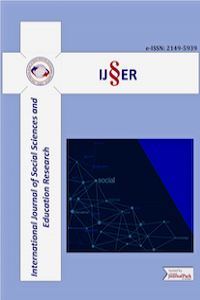Dil, hafıza ve sözcük dağarcığı çalışmaları
Dil ve hafıza üzerine yapılan çalışmalara bakılırsa paralel işleyen bir sistem yapısıyla karşı karşıya gelinecektir. Bu iki sistemin birbirine bağlı yapılarda olması birbirini etkileyen bileşenlere sahip olduğunu göstermektedir. Bu durum öğrenme süreci üzerinde odaklanmayı gerektiren eylemlerden oluşmaktadır. Özellikle, nörobiyoloji, bilişsel psikoloji ve öğrenme psikolojisinin incelediği bu alan öğrenmenin ne olduğu, öğrenme sürecinde hangi unsurların etkili olduğu, hafızamızın bu süreçte nasıl çalıştığı ve sözcüklerin nasıl öğrenildiği üzerine birtakım sorulara cevap aramakla uğraşmaktadır. Bu çalışmada, öğrenme ve hafıza üzerine ortaya atılan araştırmalar incelenerek bu tür soruların cevabına uygulamalı yöntemlerle ulaşılmaya çalışılacaktır. Bu kapsamda yabancı dil öğrenimi aşamasında sözcük dağarcığını geliştirmeye yönelik teknikler keşfedilerek yeni yönelimler üzerinde durulmaya çalışılacaktır.
Anahtar Kelimeler:
Öğrenme, Biliş, Yabancı Dil, Sözcük Dağarcığı
The language, memory and vocabulary studies
Whether the studies about language and memory are beobachted, the parallel processing system will be came across. That two interconnected systems have components which effect each other. This situation consists of activities required focusing on the process of learning phase. Particularly, this area is examined by nöroscience-biology, cognitive psychology and psychology of learning deals with the answers to find out in order to solve problems about what the learning is, which elements are influential within learning process, how our memory in this process works and the words are learned. In this study will be studied on the examinations that are interested in learning and memory. Within this context, while the techniques related with foreign language are found out, the new methods and approaches will be tried to show up.
Keywords:
Learning, Cognition, Foreign Language, Vocabulary,
___
- Batur, Z. (2008). Ana Dili Eğitiminde Hafıza-Kelime İlişkisinin Önemi ve Hafızanın Güçlendirilmesinde Ezgili Ürünlerin Rolü. Bohn, R. (1999): Probleme der wortschatzarbeit. Fernstudieneinheit 22. Berlin. Christison, M. A. K. (1999). Multiple Intelligences: Theory and Practice in Adult ESL. ERIC Digest. Genesee, F. (2000). Introduction. Bilingualism: Language and Cognition, 3(3), 167-172. Kosslyn, S. M., & Smith, E. E. (2014). Cognitive Psychology: Pearson New International Edition: Mind and Brain. Pearson Education, Incorporated. Nation, P. (2011). “The role of the first language in foreign language learning”.Asian Efl Journal. Robertson, S. P. (1994). TSUNAMI: Simultaneous understanding, answering, and memory interaction for questions. Cognitive Science, 18(1), 51-85. Spitzer, N. C. (2002). Activity-dependent neuronal differentiation prior to synapse formation: the functions of calcium transients. Journal of Physiology-Paris, 96(1), 73-80. Zimbardo, P. G., & Gerrig, R. J. (1996). Psychology and life (Book style). NY: HarperCollins. (www.tesol.org/docs/books/bk_ELTD_Vocabulary_974).
- Yayın Aralığı: Yılda 4 Sayı
- Başlangıç: 2015
- Yayıncı: Mahmut DEMİR
Sayıdaki Diğer Makaleler
Ebeveynlerin çocuk yetiştirme tutumları ile kişilik yapıları arasındaki ilişki
Leman İNANÇ, Merih ALTINTAŞ, Tülay BARIŞ
Mikroöğretim uygulamalarında akran değerlendirmelerine göre öğretmen yeterlikleri
Türk şiirinin anlam haritalarından bir kesit: Yusufcuk Dergisi’nin şiir anlayışı
Eğitimde ters-yüz sınıf uygulamaları
Şafak Uluçınar Sağır, Dilek Sakar
Kadri YILDIZ, Ahmet Gökhan Yazıcı, Kenan Çadırcı
Kişilik yapısının yeme biçimleri üzerindeki etkisi
